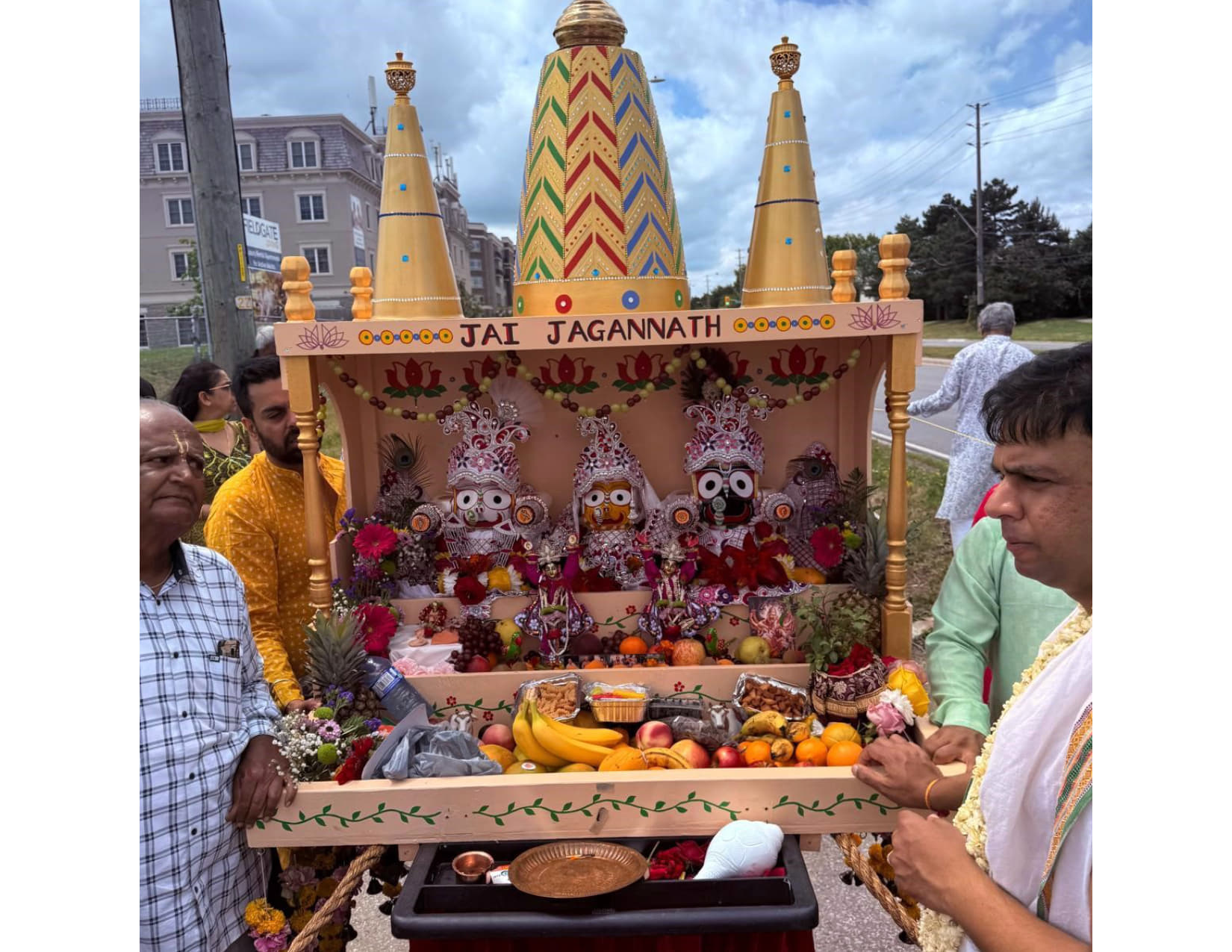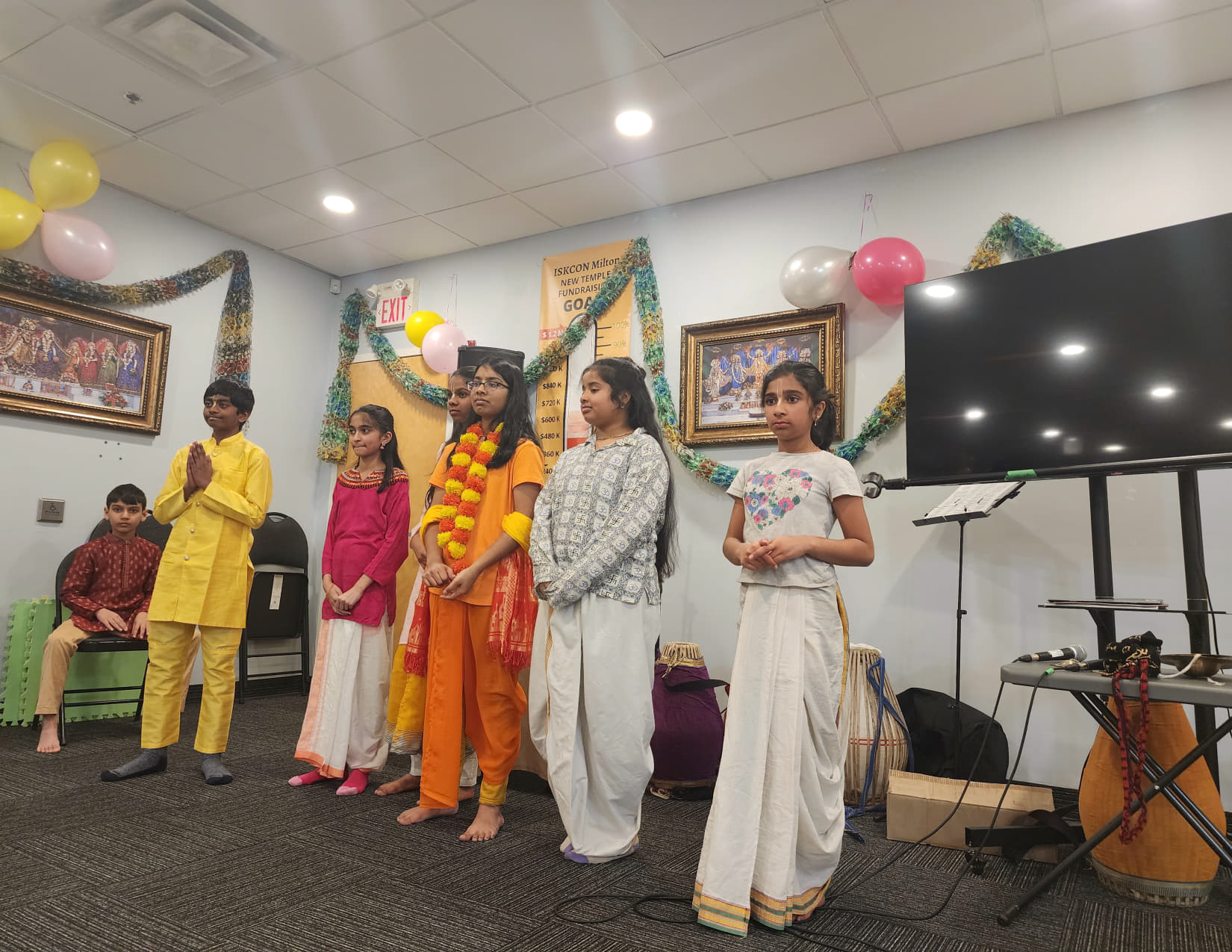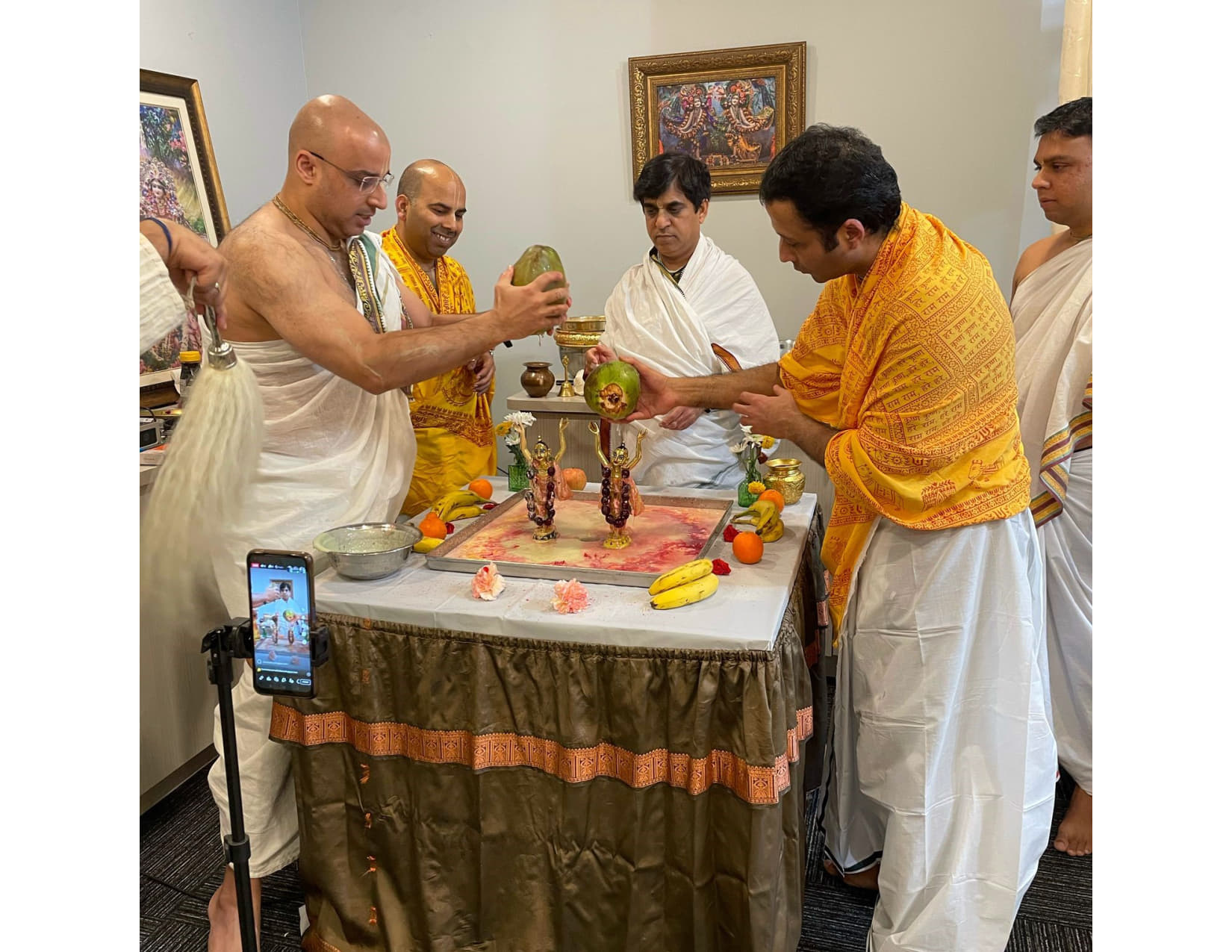Dear Śrīla Prabhupāda,
nama oṁ viṣṇu-pādāya kṛṣṇa-preṣṭhāya bhū-tale
śrīmate bhaktivedānta-svāmin iti nāmine
namas te sārasvate deve gaura-vāṇī-pracāriṇe
nirviśeṣa-śūnyavādi-pāścātya-deśa-tāriṇe
As we gather to celebrate your auspicious Vyāsa-pūjā ceremony, we are humbled by your compas-
sionate preaching. At an advanced age, you traveled to a foreign country without money, contacts,
manpower, or physical strength – driven solely by one purpose: to serve your Guru Mahārāja.
You did not come to gather mundane followers, earn money, gain fame, seek a job, or pursue a
degree. Nor did you come to start a business or establish a large following, as many yoga teachers
did. You came not to take but to give pure Kṛṣṇa consciousness to all.
Śrīla Bhaktisiddhānta Sarasvatī Ṭhākura, who valiantly spread Kṛṣṇa consciousness across
India, wanted so much to spread the message overseas. He sent a couple of disciples to London
with instructions to preach Mahāprabhu’s message in English to the Western world. Unfor-
tunately, those disciples returned after some time and proclaimed that Westerners were not
interested in the message. So your Guru Mahārāja instructed you to print books and spread the
message. You took his instruction to heart, and to fulfill the desire of your Guru Mahārāja you
charted a plan to execute his tall order.
After immense struggle, the long-awaited day of your departure for the West finally arrived.
You took your meager possessions – a suitcase, an umbrella, a supply of dry cereal, and a trunk of
your books. You didn’t know what you would find to eat in America, but you were determined to
serve your guru to the best of your ability.
Here are some memories we’ve heard from your disciples:
Śrīla Prabhupāda had his own style of answering questions: Once, a middle-aged, well-to-do Indian
businessman challenged Śrīla Prabhupāda, “Why are you building new temples when there are so
many old temples in need of renovation and repair?” Śrīla Prabhupāda didn’t answer the question
directly. Instead, he asked the gentleman, “Who is that lady sitting next to you?” The man said,
“She’s my wife.” Prabhupāda asked, “Why did you get married?” The man was flabbergasted and
couldn’t answer, so Prabhupāda said, “You got married because you wanted to have children. But
why have children when there are so many children loitering in the streets? Just as you want to
have your own child, similarly a devotee wants to build a temple, install the Deity, and offer the
temple to Kṛṣṇa.”
Śrīla Prabhupāda taught true compassion: Śrīla Prabhupāda was strict, but also compassionate
and concerned. For example, for at least two months before he passed away, he wasn’t eating
anything. Occasionally he accepted some fruit juice or a little diluted milk, but still, he regu-
larly inquired, “How are the devotees eating? How is the devotee prasādam?” One day, Śrīla
Prabhupāda asked me to check out the devotee prasādam. I came back and told him that the
prasādam was not so nice. Śrīla Prabhupāda called the temple president and reprimanded him. He
asked, “Why is the prasādam not nice?” Śrīla Prabhupāda himself hadn’t eaten for two months,
but still he was concerned about how the devotees were eating.
Śrīla Prabhupāda teaches true advancement: In Juhu, a senior godbrother was annoyed with me
and was chastising me heavily. I felt bad that he chastised me. When I went to Śrīla Prabhupāda,
Prabhupāda said, “The sign of one’s spiritual advancement is not the big position one has. The
real sign of advancement is how humble and tolerant one has become.” That instruction took
away all the heaviness in my heart and I often remember it. The sign of our advancement is not in
our position but in how humble and tolerant we have become.
Śrīla Prabhupāda (guru) knows all: One morning in Vrindavan, Śrīla Prabhupāda asked me to
prepare two varieties of spinach – green and red – as well as pumpkin, radish, eggplant, and
bitter melon. I went to the market to buy everything. When I came back, I told Śrīla Prabhupāda,
“Prabhupāda, I got everything.” Śrīla Prabhupāda asked, “What did you get?” “I got two varieties
of spinach, eggplant, pumpkin, and radish.” Then I remembered that I had forgotten to get bitter
melon. It was stupid of me, but I lied to Śrīla Prabhupāda and told him I’d also purchased bitter
melon. I thought I’d arrange to get the bitter melon later.
To my surprise, Śrīla Prabhupāda told me to bring the vegetables. I ran out. At that time there
was an employee in the guesthouse named Kishan. I gave him some money and said, “Go to the
market and get some bitter melon.” I thought he’d take ten or fifteen minutes, and in the mean-
time, I went to the kitchen and started to prepare everything. Kishan came back and said, “There
is no bitter melon in the market.” I knew that there was also no bitter melon in any of the temple
kitchens. I felt as if the whole world was crumbling. I prayed to Kṛṣṇa, “Please save me! Now I
have to tell Śrīla Prabhupāda that I lied to him and that I forgot the bitter melon.” I was think-
ing, “Prabhupāda is going to get annoyed with me, and who knows what kind of chastisement I’ll
get.” I was so dazed that instead of taking the usual passage next to the temple to Prabhupāda’s
kitchen, I started to go through the gurukula building, and there, on the balcony of the guru-
kula was a green bitter melon. I pounced on it and ran, thanking Kṛṣṇa in every possible way.
Prabhupāda was taking his massage when I went into his room with all the vegetables. He told
me how to cut them, and finally I said, “Prabhupāda, and the bitter melon?” Prabhupāda looked
at me and said, “Bitter melon?” Just the way Śrīla Prabhupāda said “bitter melon” convinced me
beyond any doubt that he knew what had happened.
Śrīla Prabhupāda brought Vrindavan: Śrīla Prabhupāda’s presence was so powerful that when you
came into his presence you felt as if you were no longer part of the material world. You felt that
you were in some kind of a spiritual, transcendental environment. I didn’t know about Vrindavan
then, but nowadays we would say that Prabhupāda brought Vrindavan with him. We felt the Vrin-
davan mood whenever we came into Prabhupāda’s presence. He was carrying Kṛṣṇa in his heart.
Śrīla Prabhupāda was most merciful: Once, Śrīla Prabhupāda was giving a lecture about how we
have to be cent percent Kṛṣṇa conscious. He was ramming home the point that we have to sur-
render to Kṛṣṇa one hundred percent. At the end of the class, the devotees were serious, looking
down, thinking, “Who can come up to the standard of complete surrender?” As if he could read
their minds, Prabhupāda relaxed his mood a little bit and said, “If you can be ninety percent
Kṛṣṇa conscious, then you can also go back to Godhead.” He was on a large, high vyāsāsana,
four feet tall, and he had to climb down some steps to get off the vyāsāsana. As he started down,
he said, “Even if you are eighty percent surrendered, Kṛṣṇa will still take you.” Then he got off
the vyāsāsana and started walking away. His chaddar was flowing behind him, dragging on the
ground. He stopped, looked at the devotees, and said, “Even if you are seventy percent Kṛṣṇa
conscious, still Kṛṣṇa will take you.” He threw his chaddar over his shoulder and walked off with
his head high.
Śrīla Prabhupāda is protecting us: Śrīla Prabhupāda was walking down the stairs in Calcutta.
Many devotees were there. He slipped a little, and it looked like he was going to fall. One of the
senior devotees said, “Watch out, Śrīla Prabhupāda.” Prabhupāda stopped and said, “It is your
responsibility to watch out. You have to take care of the body of the spiritual master. The spiritual
master looks out for your spiritual well-being, but as far as whether I fall or not, that you have to
guard against.”
Today is set aside for deep reflection on the immense sacrifices you made for us, Śrīla
Prabhupāda. Contemplating your sacrifices helps guide us on our journey both in this life and
beyond, as we strive to keep Kṛṣṇa at the center. In our lives, we must strive to imbibe your
true teachings with unwavering sincerity, free from deviation and distraction. Śrīla Prabhupāda,
embodying Kṛṣṇa’s compassion, you came to rescue us just as Kṛṣṇa saved the cowherd boys
from the deadly mouth of Aghāsura, who represents the powerful grip of the material energy in
this Age of Kali. We humbly offer our obeisances at your lotus feet, praying for your mercy and
blessings so that we may remain firmly committed to the principles of your ISKCON.
Your humble servants,
The devotees of ISKCON Milton


